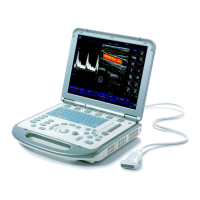Acoustic Output
23-4
In this system, imaging setups can be created using the ultrasound output set by you. At this
time, the default function is disabled. It is the user’s responsibility for any change to
the default settings.
Default choices
Initial power 10% to 100%*
* Definition of 100%: The maximum acoustic power of a transducer determined by the
increase in transducer surface temperature in the selected mode and the acoustic power
restrictions specified by the FDA.
NOTE:
This system automatically returns to the settings whenever changes are made to
the values (when you turn on the power, switch between transducers, press [End
Exam], or select Return in the Setup menu). In the factory default settings, the
Acoustic Output is limited below 100%. Following the ALARA restriction, you are
allowed to increase the acoustic power under FDA 510(k) Guidance-Track3 limits
and to set it in the image preset screen.
The acoustic output of the system has been measured and calculated in accordance with
IEC60601-2-37: 2005, FDA 510(K) GUIDANCE, Acoustic Output Measurement Standard
for Diagnostic Ultrasound Equipment (NEMA UD-2 2004) and the Standard for Real-Time
Display of Thermal and Mechanical Acoustic Output Indices on Diagnostic Ultrasound
Equipment (AIUM and NEMA UD-3 2004).
23.6 Acoustic Power Control
The qualified operator may use the system controls to limit the ultrasound output and to
adjust the quality of the images. There are three categories of system controls relative to
output. They are,
1. Controls that have direct effect on the output,
2. Controls that indirectly control output and
3. Controls that are receiver controls
Direct Controls
It is possible to control, if necessary, the acoustic output with the soft menu control on
the control panel. In this case, the maximum value of the acoustic output never
exceeds an MI of 1.9, TI of 6 and an I
SPTA.3
of 720 mW/cm
2
in any mode of operation.
Indirect Controls
The controls that indirectly affect output are many imaging parameters. These are
operating modes, frequency, focal point positions, image depth and pulse repetition
frequency (PRF).
The operating mode determines whether the ultrasound beam is scanning or
non-scanning. Thermal bioeffect is closely connected to M Mode, Doppler and Color
Mode. Acoustic attenuation of tissue is directly related to transducer frequency. The
focal point is related to active aperture of transducer and beam width. For the higher
PRF (pulse repetition frequency), the more output pulses occur over a period of time.
Receiver Controls
The receiver controls (for example, gain, dynamic range, and image post-processing,
etc.) do not affect output. These controls should be used, when possible, to improve
the image quality before using controls that directly or indirectly affect output.

